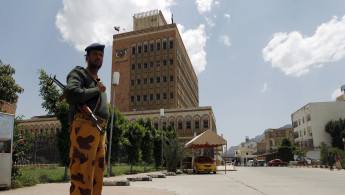Yemeni leader relocates central bank in blow to rebels
Yemen’s exiled president sacked the head of the central bank on Sunday and ordered it relocated to the southern city of Aden, a move that would ramp up pressure on the Houthi rebels who control the capital but also bring increased hardship to millions of Yemenis living under their rule.
President Abed Rabbo Mansour Hadi announced the move from Saudi Arabia late on Sunday. Hadi’s forces control Aden, while the Houthis rule the capital, Sanaa, in the north. Most of Yemen’s 26 million people are concentrated in the rebel-held north.
Yemen’s limited oil revenues flow to the central bank. Sunday’s move would therefore deprive the Houthis of a potential source of cash. The rebels’ opponents have long accused them of plundering the Treasury.
Yemen’s conflict pits Hadi’s government, which is allied with a Saudi-led military coalition, against the Houthis and security forces loyal to former President Ali Abdullah Saleh.
The Saudi-led coalition has been waging an air campaign against the Houthis and their allies since March 2015, and the war has left some 10,000 people dead or wounded.
The relocation of the bank will likely cause further economic deterioration in the north, where Saudi-led airstrikes have caused widespread destruction.
Government employees have not been paid in months, and the capital, like most Yemeni cities, suffers shortages of fuel, water, electricity and basic goods.
Hadi announced the move as part of a limited Cabinet reshuffle. The current head of the central bank, Mohammed bin Hamam, will be replaced by Mansar al-Kaiti, an independent technocrat who has served as Hadi’s finance minister. Hadi has been based in Saudi Arabia since the Houthis seized the capital in 2014.





 Follow the Middle East's top stories in English at The New Arab on Google News
Follow the Middle East's top stories in English at The New Arab on Google News
![The UAE is widely suspected of arming the RSF militia [Getty]](/sites/default/files/styles/image_330x185/public/2024-11/GettyImages-472529908.jpg?h=69f2b9d0&itok=Yauw3YTG)
![Netanyahu furiously denounced the ICC [Getty]](/sites/default/files/styles/image_330x185/public/2024-11/GettyImages-2169352575.jpg?h=199d8c1f&itok=-vRiruf5)
![Both Hamas and the Palestinian Authority welcomed the ICC arrest warrants [Getty]](/sites/default/files/styles/image_330x185/public/2024-11/GettyImages-2178351173.jpg?h=199d8c1f&itok=TV858iVg)